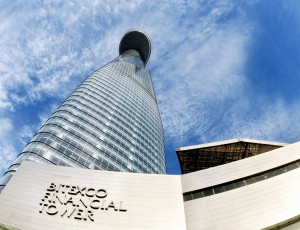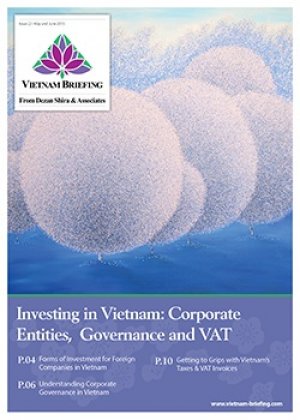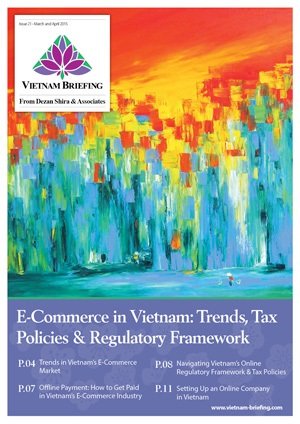Spain-Vietnam Trade Relations and Further Opportunities for Growth
By Oscar Mussons & Fernando Vidaurri 
Vietnam, the fastest growing economy in ASEAN, will be on the radar of more investors in 2016. The country has a large low-cost labor force and fast growing economy that have made it an attractive alternative to more expensive manufacturing markets such as China. In 2015, Vietnam agreed to the TPP, became integrated within the ASEAN Economic Community, and signed a number of important FTAs. 2016 will also see Vietnam finalize important treaties, such as the text for the EU-Vietnam FTA (EVFTA), which could be ratified by 2017, and come into force in 2018.
 RELATED: Update on the EU-Vietnam Free Trade Agreement Discussions
RELATED: Update on the EU-Vietnam Free Trade Agreement Discussions
Within the European Union, Spain has sought to increase trade with Vietnam, and has been working towards that goal before the EU-Vietnam FTA comes into place. Both countries signed a strategic partnership in 2009 and have seen increasing bilateral cooperation in multiple fields, such as politics, economics, culture, and education. In fact, according to the Spanish State Secretary for Foreign Affairs Ignacio Ybanez Rubio, “Spain considers Vietnam a reliable partner.” However, he recognized that trade between both nations still needs to reach its full potential.
Current Trade Relations
In 2014, Vietnam-Spain bilateral trade reached US $2.5 billion. For 2015, trade turnover is expected to have increased by 15 percent. The main exports from Spain to Vietnam included chemical products, machinery, textiles, raw materials, and plastics Both countries have also worked together on large construction projects as well as cooperated on policies in other areas that would strengthen business ties between the two partners.
On the diplomatic level, in 2015 Vietnam introduced a visa exemption for citizens of five EU countries, among them Spain. This visa exemption has been warmly welcomed by Spain, and has been seen as move that could help attract more Spanish tourist, as well as investors to the tourism industry.
 RELATED: Visa Waiver for Citizens of France, Germany, Italy, Spain, and the UK
RELATED: Visa Waiver for Citizens of France, Germany, Italy, Spain, and the UK
While identifying the advantages and potential for investment of many localities in Vietnam, Spanish Economic and Commercial Counsellor to Vietnam Jose Antonio Bretones has recognized that there are still many areas in which trade can be improved. Mr. Bretones made those comments in the context of the “Meet Spain” event held in Hanoi in October 2015, where he mentioned that investment remains lower than expected, with only 30 firms involved in project in Vietnam. While investment is expected to increase once the FTA comes into effect in the meantime, there are many industries which display good growth potential such as infrastructure, energy, tourism, and food processing.
Promising Industries for Spain-Vietnam Trade
Construction Industry and Real Estate
The fast growth of the economy, accelerated industrialization and rapid urbanization of Vietnam present multiple opportunities for Spanish construction companies. In fact, some big Spanish construction companies have been investing in construction projects in Vietnam for a while. Projects include construction contracts awarded to OHL Group for various motorways in conjunction with consortium of local companies.
Vietnam’s construction and real estate sector will continue growing as the country continues to urbanize. Over the past decade Vietnam’s urban population has expanded by 3.5 percent annually. During the same period, from 2005 to 2014 Vietnam’s construction sector expended at a compound annual growth rate (CAGR) of 10 percent, while foreign investment in the sector grew at a CAGR of 14 percent. Companies seeking to invest in the real estate sector now are also able to benefit from the “Law on Real Estate Business” which went into effect on July 1, 2015. Under the new law foreign entities and individuals are now allowed to buy property for use as factories, office or for any other business purposes.
Renewable Energy
As Vietnam continues its rapid industrialization, this will put more pressure on its electricity system, especially given that demand has a 10 percent annual increase over the past decade. Given that demand is expected to increase further over the next 20 years, the Vietnamese government has started looking at renewable energy sources such as hydropower, which currently supplies one third of its energy needs. Meanwhile, Spain is a world leader in renewable energy with many companies leading in research and development efforts in areas such as wind turbines and photovoltaic panels.
Based on data from the General Department of Energy, the electricity output for 2015 ranged between 194 and 210 billion kWh. This amount is expected to increase to between 330-362 billion kWh by 2020. Since the Vietnamese government has issued a Clean Energy Development Plan that calls for a of 10 to 20 percent decrease in carbon dioxide emissions, the need for investment in clean technologies becomes crucial. In order to achieve these objectives and meet the rising energy demands the Vietnamese government has continued to open the sector to private investment. Thus, Spanish companies with expertise are well placed to invest in these areas.
Tourism
Tourism is an especially attractive area for investment due in part to the visa exemption rules adopted by Vietnam for Spanish citizens. This will not only increase tourism in Vietnam, but also increase investment in the tourism industry by taking advantage of the multiple cultural and natural attractions available in the country.
Before the visa exemption was put in place the number of Spanish tourist rose by 22.7 percent from 2013 to 2014, according to Vietnam’s National Administration of Tourism. In the medium and long term these figures can be expected to increase significantly. In fact, a month after the visa exemption went into effect Vietnam saw a 159 percent increase on the number of Spanish arrivals from a month earlier.
While the sharp increase may have been influenced by the policy going into effect during the summer holiday season, it is clear that tourism remains an area with growing potential.
With 4.6 million tourists in the Ho Chi Minh area alone in 2015 and US $4.16 billion grossed by the local tourism sector, a 10 percent increase year on year on revenue, this is an industry that cannot be overlooked. Furthermore, the sector is ed to keep growing with revenue gross by the local tourism sector forecasted to reach US $5.1 billion in 2016 in the HMC area alone. The continual growth in this industry has proven very attractive for Spanish companies such as Melia Hotels International. The hotel chain company opened its second hotel in Vietnam in 2015, in the city of Da Nang and plans to open a third hotel in 2016, which will enable it to continue its expansion in the Asia region.
Textiles and Fashion
The textile industry is one of the strongest industries in Vietnam, due to the low labor costs and well-integrated supply chains, which have made the country the fourth largest textile exporter in the world. The new economic treaties and agreements recently signed by the country, such as the TPP and the EVFTA, which could be finalized this year, will help attract more investment in this area.
 RELATED: Pre Investment, Market Entry Strategy and Advisory by Dezan Shira and Associates
RELATED: Pre Investment, Market Entry Strategy and Advisory by Dezan Shira and Associates
Based on data from the Vietnam Textile and Garment Association production growth for the next five years is expected to increase at a growth of 12 to 14 percent per year, while exports are expected to grow at 15 percent per year over the same period. This has proved very attractive for Spanish fashion manufacturers like Inditex’s Zara and Mango that benefit from the close proximity between its factories and its increasing number of stores in the region.
Additionally, as Vietnam’s middle class rises and incomes , these same companies can not only benefit from the low manufacturing costs, but also from the increased purchasing power of Vietnam’s middle class. opened stores in Hanoi and Ho Chi Minh, proving that as incomes continue to rise in Vietnam and throughout Asia, companies can benefit from the many advantages the country offers, as well as have closer access to its growing Asian customer base.
Further Support from Dezan Shira & Associates
With decades of experience operating in the region, the specialists at Dezan Shira & Associates are well placed to help Spanish companies enter and succeed in the Vietnamese market. We are happy to offer support directly through our Spanish Desk. For more information, please get in touch further at vietnam@dezshira.com.
|
Asia Briefing Ltd. is a subsidiary of Dezan Shira & Associates. Dezan Shira is a specialist foreign direct investment practice, providing corporate establishment, business advisory, tax advisory and compliance, accounting, payroll, due diligence and financial review services to multinationals investing in China, Hong Kong, India, Vietnam, Singapore and the rest of ASEAN. For further information, please email vietnam@dezshira.com or visit www.dezshira.com. Stay up to date with the latest business and investment trends in Asia by subscribing to our complimentary update service featuring news, commentary and regulatory insight. |
Investing in Vietnam: Corporate Entities, Governance and VAT
 In this issue of Vietnam Briefing Magazine, we provide readers with an understanding of the impact of Vietnam’s new Laws on Enterprises and Investment. We begin by discussing the various forms of corporate entities which foreign investors may establish in Vietnam. We then explain the corporate governance framework under the new Law on Enterprises, before showing you how Vietnam’s VAT invoice system works in practice.
In this issue of Vietnam Briefing Magazine, we provide readers with an understanding of the impact of Vietnam’s new Laws on Enterprises and Investment. We begin by discussing the various forms of corporate entities which foreign investors may establish in Vietnam. We then explain the corporate governance framework under the new Law on Enterprises, before showing you how Vietnam’s VAT invoice system works in practice.
E-Commerce in Vietnam: Trends, Tax Policies & Regulatory Framework
In this issue of Vietnam Briefing Magazine, we provide readers with a complete understanding of Vietnam’s e-commerce industry. We begin by highlighting existing trends in the market, paying special attention to scope for foreign investment. We look at means for online sellers to receive payment in Vietnam, examine the industry’s tax and regulatory framework, and discuss how a foreign retailer can actually establish an online company in Vietnam.
 Tax, Accounting, and Audit in Vietnam 2014-2015
Tax, Accounting, and Audit in Vietnam 2014-2015
The first edition of Tax, Accounting, and Audit in Vietnam, published in 2014, offers a comprehensive overview of the major taxes foreign investors are likely to encounter when establishing or operating a business in Vietnam, as well as other tax-relevant obligations. This concise, detailed, yet pragmatic guide is ideal for CFOs, compliance officers and heads of accounting who need to be able to navigate the complex tax and accounting landscape in Vietnam.
- Previous Article Vietnam Market Watch: Aviation Growth, 7-Eleven’s entrance to Vietnam, and Strengthening Business Operations
- Next Article Vietnam Regulatory Brief: Updated Vehicle Codes, Netflix in Hot Water, and What to Make of Loosening Gambling Restrictions










